Copyright issues are critical for creators and businesses alike, as they navigate the complexities of compliance, regulations, and distribution rights. Understanding the Fair Use Doctrine and the importance of copyright registration is essential to protect intellectual property and avoid infringement penalties. Additionally, effective copyright management practices are vital for ensuring legal distribution and monetization of creative works in the digital landscape.
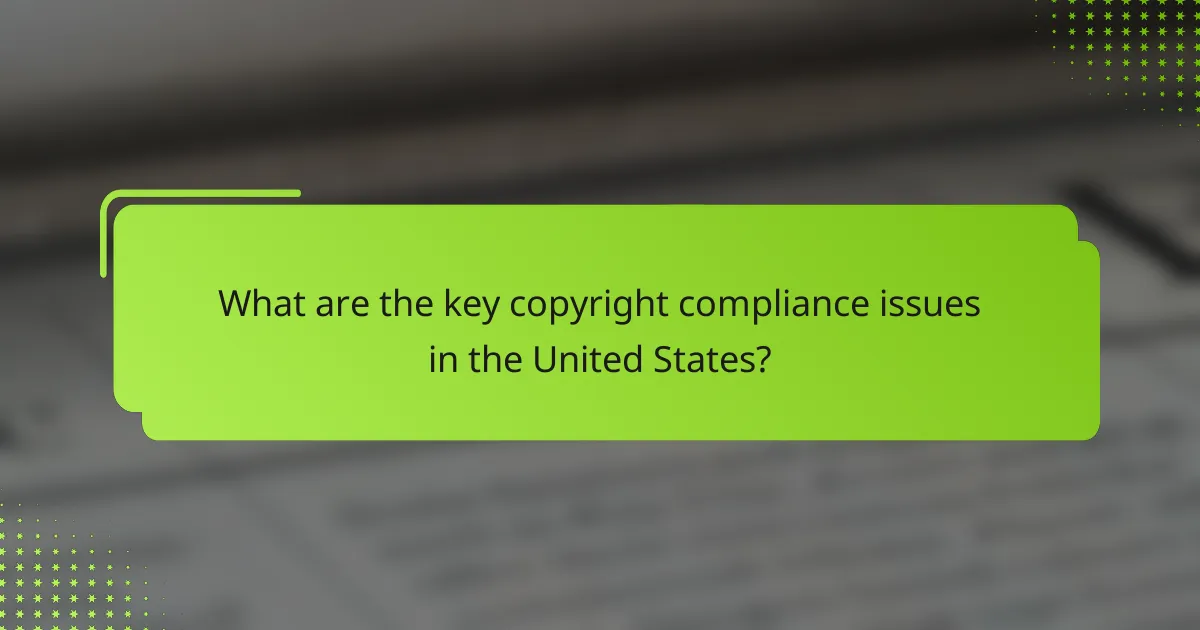
What are the key copyright compliance issues in the United States?
Key copyright compliance issues in the United States include understanding the Fair Use Doctrine, the importance of copyright registration, and the penalties for infringement. Navigating these areas is crucial for creators and businesses to protect their intellectual property and avoid legal disputes.
Fair Use Doctrine
The Fair Use Doctrine allows limited use of copyrighted material without permission from the rights holder. This can include commentary, criticism, news reporting, teaching, or research. However, determining what constitutes fair use depends on factors such as the purpose of use, the nature of the copyrighted work, the amount used, and the effect on the market value of the original work.
Creators should assess each situation carefully, as fair use is not a blanket exemption. It’s advisable to seek legal counsel when in doubt, especially if the use could significantly impact the market for the original work.
Copyright Registration
While copyright protection is automatic upon creation, registering a work with the U.S. Copyright Office provides legal advantages. Registration establishes a public record and is necessary for filing a lawsuit for infringement. It also allows for statutory damages and attorney’s fees in litigation, which can be a significant benefit.
To register, creators must complete an application, pay a fee (typically ranging from $35 to $55), and submit a copy of the work. Timely registration is crucial, as it must occur before any infringement occurs to maximize legal protections.
Infringement Penalties
Infringement of copyright can result in severe penalties, including statutory damages ranging from hundreds to thousands of dollars per work, depending on the nature of the infringement. Additionally, courts may impose actual damages, which can be based on lost profits or unauthorized profits made by the infringer.
To avoid penalties, individuals and businesses should ensure they have the proper licenses or permissions for any copyrighted material they use. Regular audits of content and training for employees on copyright compliance can help mitigate risks associated with infringement.
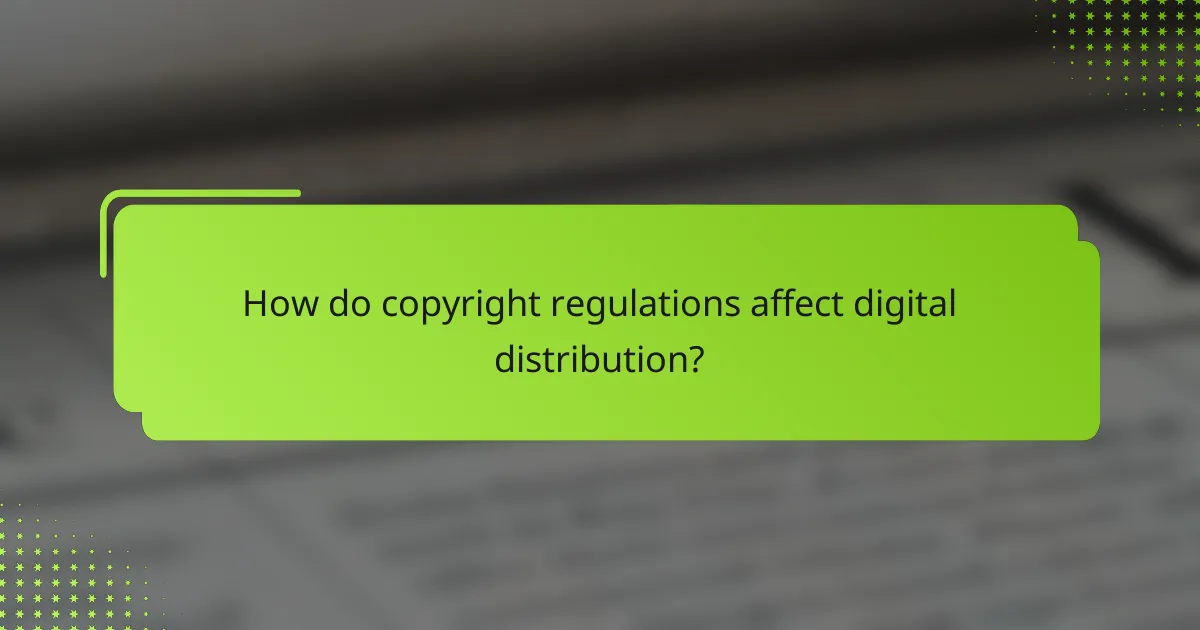
How do copyright regulations affect digital distribution?
Copyright regulations significantly impact digital distribution by establishing the legal framework for how content can be shared and monetized online. Compliance with these laws is essential for businesses to avoid legal repercussions and ensure fair use of creative works.
DMCA Compliance
The Digital Millennium Copyright Act (DMCA) provides a safe harbor for online service providers, protecting them from liability for user-generated content as long as they comply with specific requirements. To achieve DMCA compliance, platforms must promptly address copyright infringement claims and implement a notice-and-takedown system.
Content distributors should maintain clear policies regarding copyright infringement and ensure that users are aware of these policies. Regular training for staff on DMCA procedures can help prevent unintentional violations and foster a culture of compliance.
Licensing Agreements
Licensing agreements are essential for legally distributing copyrighted materials. These contracts specify the terms under which content can be used, including duration, geographic limitations, and any financial arrangements. Understanding the nuances of licensing can help avoid costly legal disputes.
When entering licensing agreements, consider negotiating terms that align with your distribution goals. For example, exclusive licenses may offer higher revenue potential but limit your ability to distribute similar content. Always consult legal experts to ensure that agreements protect your interests and comply with copyright laws.
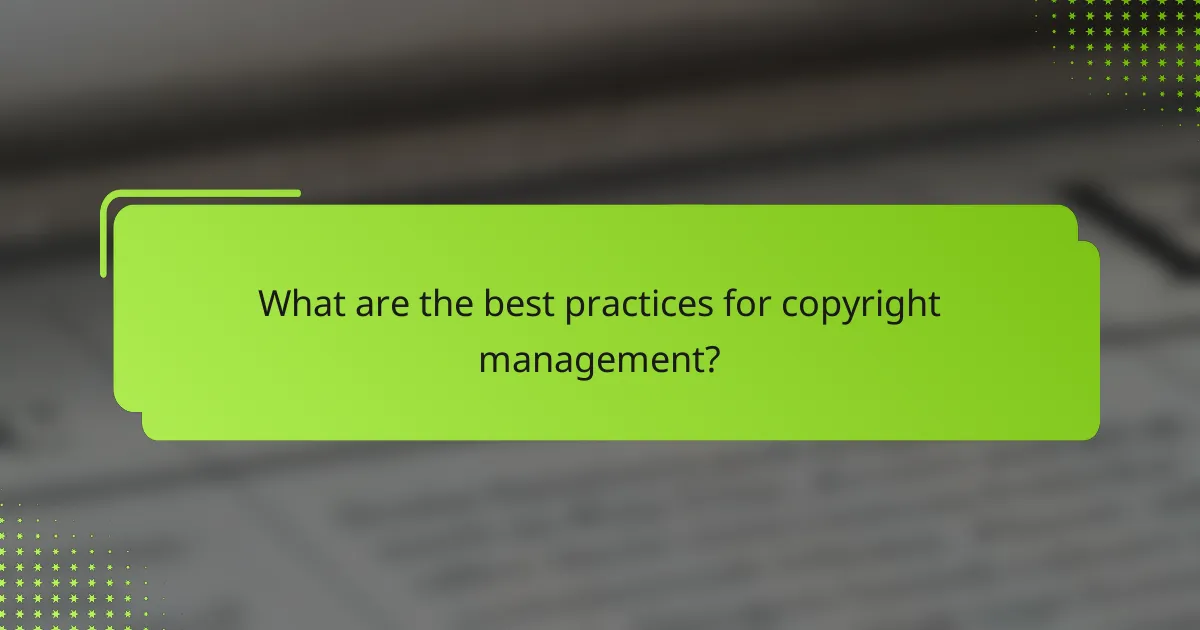
What are the best practices for copyright management?
Effective copyright management involves understanding and implementing key practices that protect intellectual property while ensuring compliance with regulations. Best practices include conducting content audits, following attribution guidelines, and utilizing monitoring tools to safeguard rights and manage distribution effectively.
Content Audits
Content audits are essential for identifying copyrighted materials within your assets. Regularly reviewing your content helps ensure that all uses comply with copyright laws and licensing agreements. Aim to conduct audits at least annually or whenever significant changes occur in your content library.
During a content audit, categorize materials by their copyright status, such as original works, licensed content, and public domain items. This organization will help you track usage rights and identify potential infringement risks.
Attribution Guidelines
Attribution guidelines dictate how to properly credit creators of copyrighted works. Following these guidelines not only respects the rights of the original authors but also enhances your credibility. Ensure that you clearly state the name of the creator, the title of the work, and the source, if applicable.
When using third-party content, familiarize yourself with specific attribution requirements, as they can vary by license type. For example, Creative Commons licenses often have distinct stipulations for attribution that must be adhered to in order to avoid legal issues.
Monitoring Tools
Monitoring tools help track the use of your copyrighted content across various platforms. These tools can alert you to unauthorized usage, enabling timely action to protect your rights. Consider using services that offer automated monitoring for comprehensive coverage.
Popular monitoring tools include Google Alerts, Copyscape, and specialized copyright management software. Regularly reviewing reports from these tools can help you identify potential infringements and take appropriate measures, such as sending takedown notices or negotiating licenses.
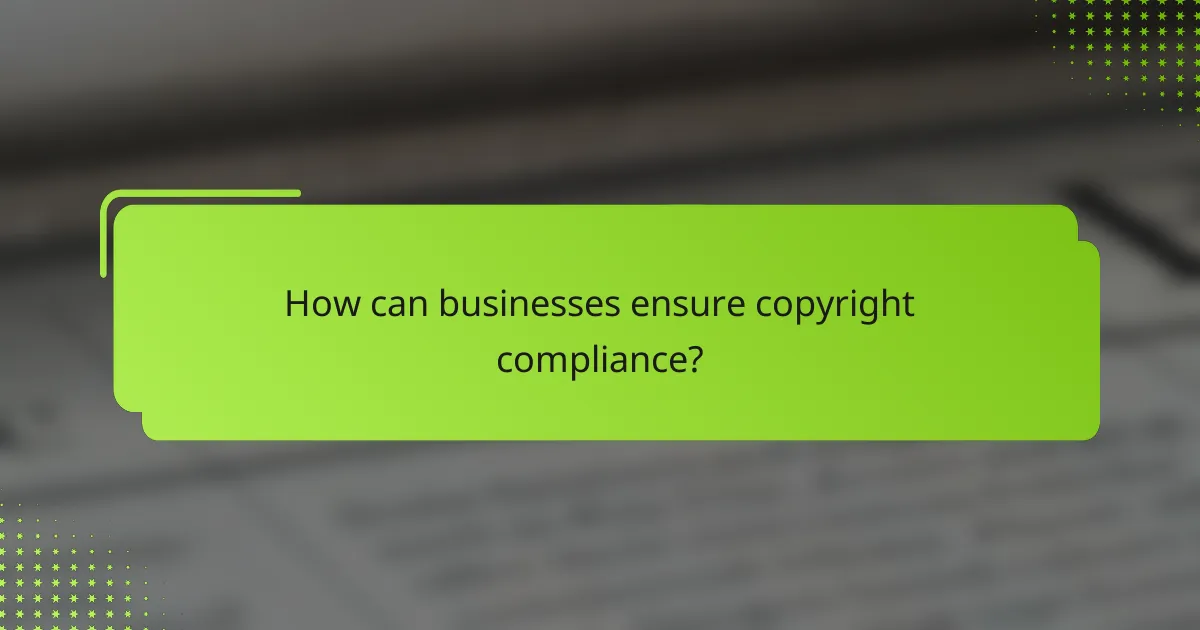
How can businesses ensure copyright compliance?
Businesses can ensure copyright compliance by understanding and adhering to copyright laws, obtaining necessary licenses, and implementing internal policies. This proactive approach helps avoid legal disputes and fosters respect for intellectual property.
Legal Consultation
Engaging a legal consultant specializing in copyright law is essential for businesses to navigate complex regulations. A legal expert can provide tailored advice on copyright issues, helping to identify potential risks and ensuring that all content used is properly licensed.
Regular consultations can also keep businesses updated on changes in copyright legislation, which can vary significantly by jurisdiction. This is particularly important for companies operating in multiple countries, as they must comply with local laws and international treaties.
Training Programs
Implementing training programs for employees is crucial in promoting copyright awareness within an organization. These programs should cover the basics of copyright law, the importance of compliance, and the consequences of infringement.
Training can include workshops, online courses, and resources that help employees understand how to properly use copyrighted materials. Regular updates and refresher courses can reinforce knowledge and adapt to any changes in copyright regulations.
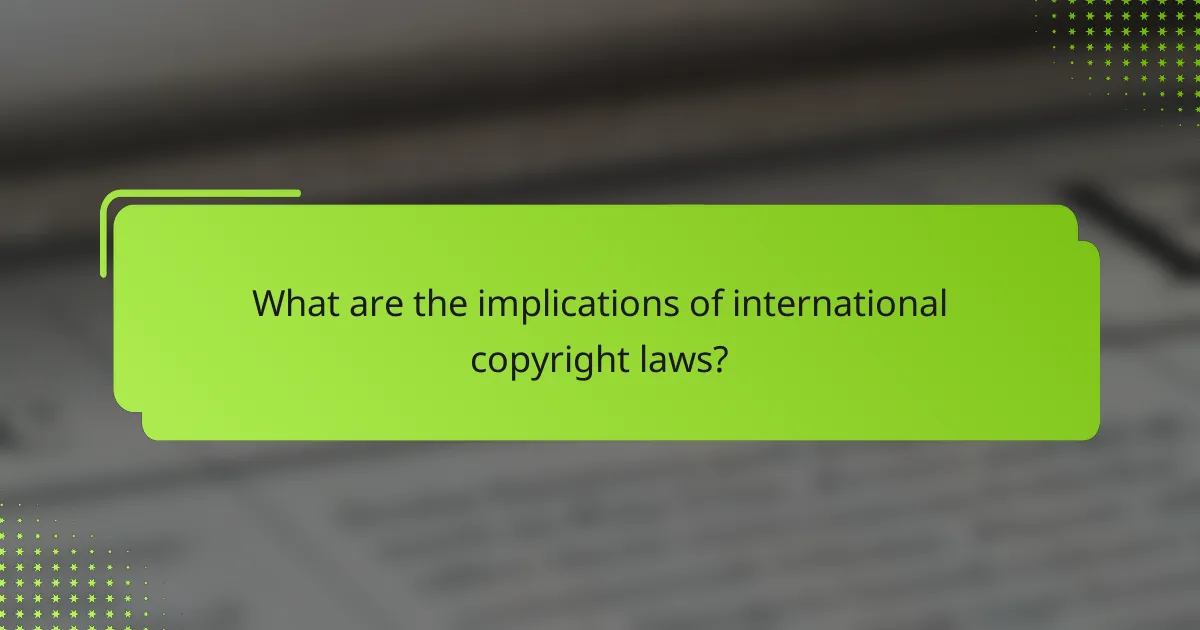
What are the implications of international copyright laws?
International copyright laws establish a framework for protecting creative works across borders, affecting how these works are used, distributed, and enforced. Understanding these laws is essential for creators and businesses to navigate rights and obligations in different jurisdictions.
Berne Convention
The Berne Convention is a key international treaty that governs copyright protection. It requires member countries to recognize the copyright of works from other member states without the need for formal registration. This means that a book published in France is automatically protected in the United States and vice versa.
Under the Berne Convention, the minimum duration of copyright protection is typically the life of the author plus 50 years, although many countries extend this period. Creators should be aware that while the convention provides a baseline, individual countries may have additional laws that offer further protections.
Regional Differences
Regional differences in copyright laws can significantly impact how works are protected and enforced. For example, the European Union has harmonized many aspects of copyright law, but individual member states may still have unique provisions that affect enforcement and duration.
In contrast, countries like the United States have a more flexible approach, allowing for fair use exemptions that can complicate copyright claims. Creators should familiarize themselves with the specific regulations in each region where their works will be distributed to avoid potential legal issues.
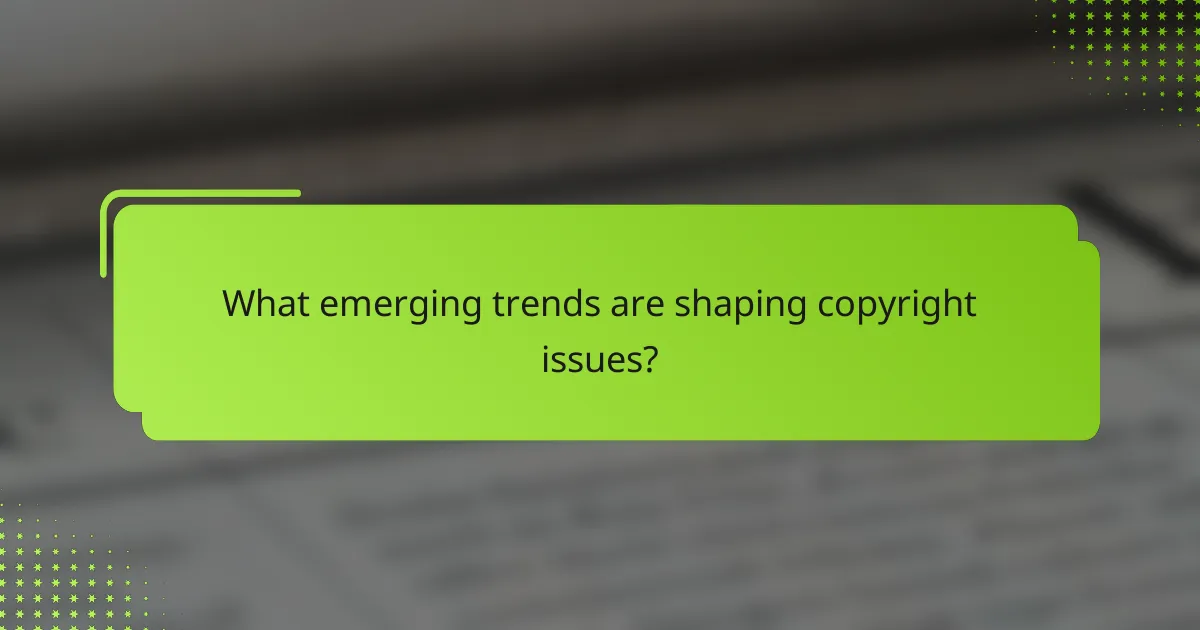
What emerging trends are shaping copyright issues?
Emerging trends in copyright issues are significantly influenced by advancements in technology, particularly in artificial intelligence, blockchain, and social media. These developments are reshaping how creators protect their work, manage rights, and navigate compliance with regulations.
AI and Copyright
Artificial intelligence is transforming copyright by enabling the creation of original works and complicating ownership questions. For instance, when an AI generates music or art, determining who holds the copyright—the developer, the user, or the AI itself—can be unclear.
Creators should consider the implications of using AI tools. It is essential to review the terms of service of AI platforms, as they may claim rights over generated content. Understanding these terms can help avoid potential legal disputes.
Blockchain for Rights Management
Blockchain technology offers a decentralized method for managing copyright and distribution rights. By using smart contracts, creators can automate licensing agreements and ensure they receive royalties directly when their work is used.
Implementing blockchain can enhance transparency in rights management, but it requires a solid understanding of the technology. Creators should evaluate platforms that support copyright registration and explore how they can leverage blockchain for their works.
Impact of Social Media on Copyright
Social media platforms have changed how content is shared and consumed, often leading to copyright infringement issues. Users frequently share copyrighted material without permission, raising questions about fair use and the responsibilities of platforms.
To navigate these challenges, creators should actively monitor their work online and use tools provided by social media platforms to report unauthorized use. Establishing clear guidelines for sharing content can also help mitigate risks associated with copyright violations.



